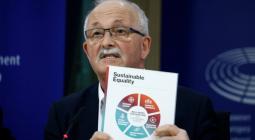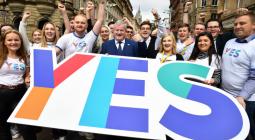Nigel Farage’s hard-right faction won Brexit. Now net zero is in its sights

A small group of rightwing MPs are jangling Tory nerves and using questions about living costs to undermine climate action
First it was Brexit, followed by a spurt of very successful campaigning to ensure that Britain left Europe on the most stringent and self-harming terms. For a while, Nigel Farage then opposed Covid restrictions. Now, he is reviving his old hostility to action on the climate emergency, with a new vehicle called Britain Means Business, which has spawned a campaign called Vote Power Not Poverty. Both were recently launched by an article in the Mail on Sunday. “Net zero is net stupid,” wrote Farage, who drew a line from the government’s green targets to the rising cost of living and made the case not just for a referendum on the issue, but also the return of fracking and coal-mining.
Later this month, alongside his close ally Richard Tice and the local Tory MP, Farage was meant to be the star of an anti-net zero rally at Whites Hotel in Bolton, Greater Manchester, built into the home ground of Bolton Wanderers FC. Their putative hosts soon announced that the event was “not something the club and business wishes to be associated with”, and pulled the plug: a “Moscow-style rebuke to free speech”, said the organisers. But, as it turned out, this was an irrelevant blip. The event is now happening at another venue, and besides, Boris Johnson is reportedly set to review the current moratorium on fracking – “the first victory for common sense,” says Farage – as part of plans to increase the UK’s production of oil and gas. Johnson’s pretext is Vladimir Putin’s invasion of Ukraine, and what it means for the UK and Europe’s energy security – but he is clearly responding to months of pressure on net zero from the political right, both inside and outside the Conservative party. Brexit was its defining big win; now it has its eyes on another.
In the midst of the Ukraine crisis, there is a comfy and complacent view around that the links between rightwing populists and Putin will hasten their downfall. It’s an idea symbolised by the Italian politician Matteo Salvini’s public shaming on a visit to the Polish-Ukrainian border for his pro-Putin posturing, and Marine Le Pen’s shredding of leaflets featuring an image of her alongside the Russian president. These people do indeed look suddenly wrongfooted and nervous – but Farage and his allies play by a different set of rules, partly because they do not have to worry about parliamentary representation and any aspiration to power (and, therefore, responsibility). Because they have been shut out by our electoral system, they long ago developed a much craftier and more light-footed way of operating: making as much noise as possible outside the normal structures of power and politics while encouraging rebellious Tories, and thereby putting continual pressure on the Conservative party via its right flank.
The result is a transformation of Tory politics that is still too little understood. A loose but hugely influential hard-right coalition has cohered, buoyed up by our exit from the EU, and now determined to use questions about living costs and energy security to destroy any meaningful prospect of climate action. In parliament, some of its key voices congregate around such Conservative MPs as Steve Baker and Mark Harper, who are responsible for an ever-evolving list of bodies including the European Research Group and the Net Zero Scrutiny Group (and, like Farage, well aware that you can wield power without having to worry about accountability). In the cabinet, their ideological torch is carried by such ministers as Priti Patel, Nadine Dorries and Jacob Rees-Mogg.
But the new right’s key element is a political faction outside the party walls, with a very modern grasp of how 21st-century politics works. Farage remains this element’s unchallenged leader and figurehead: its clout is based on agile organising skills and handsome funds, a constant platform in the rightwing press, a big presence on social media – and now, the TV channel GB News. (The channel’s viewing figures belie its significance: it exists chiefly as a source of endless clips that are spread on social media, in which dubious and toxic opinions – not least about Russia and Ukraine – are presented in the same context as mainstream news, and thereby normalised.)
Faced with a prime minister as weak and biddable as Boris Johnson, all these people know that their key task is a kind of elevated trolling. In byelections, the latest Farage vehicle need only get a relative handful of votes to jangle Tory nerves: back in December, when Tice and the new Reform party got a mere 6.6% of the vote at Bexley and Old Sidcup, the Spectator’s Katy Balls wrote in the Guardian that his performance highlighted fears among ministers “that a party will emerge that will outflank them on the right”. Those anxieties inform a huge chunk of policy. Farage’s return to politics, let us not forget, was presaged by all the noise he made about people crossing the Channel: now, even as he tells his GB News viewers that he is “open-minded and open-hearted” about people fleeing Ukraine, the government’s cruel treatment of Ukrainian refugees is partly based on fear of how much noise the post-Brexit right would make if Britain did the correct thing and followed the open-door lead set by the EU.
In keeping with the old rules of politics, a lumbering, hidebound Labour party still focuses just about all its energies on attacking the Conservative leadership. But Johnson and his allies are actually downstream of the new right, much as the traditional US Republican party is now subservient to a political movement that began well outside the political mainstream. Indeed, by the time the government announces its latest policy shift, it is usually too late: the work has been done elsewhere, by people and forces that Labour barely acknowledges. Worse still, there is a constant sense that Farage and his allies’ portrayal of kind of Brexit-supporting voters concentrated in so-called red wall seats also exerts a strong pull on Keir Starmer and his colleagues.
Who does Farage actually speak for? Even in England, his base probably amounts to no more than five to 10% of the population. To some extent, his career represents a rearguard action against the fact that social conservatism and belligerent nationalism – along with climate scepticism – find increasingly little echo among younger people, and, for reasons that have more to do with demography than politics, their appeal will, sooner or later, start to wane. I have been to enough Farage events to know his people by sight: a passionate and fearful crowd, disproportionately male, and often well-versed in the vocabulary of conspiracy theories. Even if their views blur into a much bigger mess of fear, insecurity and prejudice, that should not blind anyone to how out-there they are, and how straightforwardly Farage’s transparent opportunism could be taken down. But seemingly for fear of giving him even more publicity, even as Brexit’s failures and lies pile up, he is largely left alone.
In that sense, his success says as much about his opponents as it does about him. Indeed, those of us who would like a kinder, better country than the one he claims to speak for perhaps have a lot to learn from his methods, as last week’s events prove. If net zero is to happen, its complexities and challenges will have to be explained to a lot more people than the comparative few who have so far bought into the idea. And in that sense, even if Farage’s rally ran into trouble, it highlighted a very telling question: for all their zeal and righteousness, when was the last time that people who support net zero organised a big event in Bolton?
Author: John Harris
Illustration: Nathalie Lees





